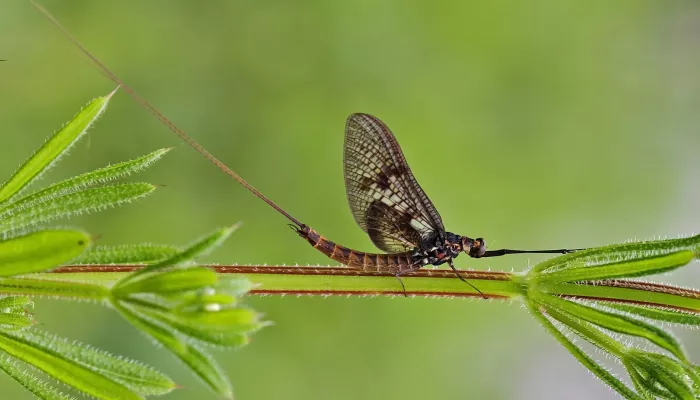Silverfish
The silverfish is so-named for its fish-like way of moving and its silvery scales. It can be found in the damp corners of the house, such as the kitchen or bathroom. Infestations can cause serious damage.

Some of the insect species that you need to know about including caddisflies, lacewings, mayflies and silverfish. Learn about Kent's species and how to support them in our species explorer.
The silverfish is so-named for its fish-like way of moving and its silvery scales. It can be found in the damp corners of the house, such as the kitchen or bathroom. Infestations can cause serious damage.
Also known as the 'green drake mayfly', the common mayfly can be found around unpolluted wetlands, such as lakes and rivers. It has transparent, lacy wings and three long 'tails'.
As the name suggests, the Common medium stonefly is found in gravelly upland rivers and streams, often on bankside stones and plants. There are 34 species of Stonefly in the UK, which are hard to tell apart.
Despite popular belief, and its name (from the Old English for 'ear beetle'), the Common earwig will not crawl into your ear while you sleep - it much prefers a nice log or stone pile! It feeds on organic matter, recycling important nutrients.
You are most likely to spot the cat flea if you have pets. It will feed on cats, dogs and people, although it can't live on us. It is a pest and needs to be controlled in the house for the comfort of pets and people.
The common green lacewing is a lime green, delicate insect, with translucent, intricately veined wings. It is common in gardens and parks, where it helps to control aphid pests.
The Alder fly is a blackish invertebrate, with delicately veined wings that it folds over its body like a tent. It can be found near ponds and slow-flowing rivers; the larvae living in the silt at the bottom.
The scorpion fly, as its name suggests, has a curved 'tail' that looks like a sting. It is, in fact, the males' claspers for mating. It is yellow and black, with a long 'beak'. Look for it in gardens and woods.
Caddisflies are a large order of insects that can be found in all kinds of wetlands. The larvae are known for making cases to pupate in, gathering stones, sand and leaves, and wrapping them with silk.
The Land caddis is the only caddisfly in the UK to spend its entire time on land, with no stage in water. Look in oak leaf litter over winter to see the grainy cases of the larvae, in which they turn into adults.